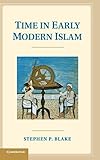Time in early modern Islam : calendar, ceremony, and chronology in the Safavid, Mughal, and Ottoman empires / Stephen P. Blake.
Publisher: Cambridge : Cambridge University Press, 2013Copyright date: ©2013Description: xiii, 209 pages ; 24 cmContent type:- text
- unemediated
- volume
- 1107030234
- 9781107030237
| Item type | Current library | Home library | Collection | Call number | Materials specified | Copy number | Status | Date due | Barcode | |
|---|---|---|---|---|---|---|---|---|---|---|
| AM | PERPUSTAKAAN TUN SERI LANANG | PERPUSTAKAAN TUN SERI LANANG KOLEKSI AM-P. TUN SERI LANANG (ARAS 5) | - | CE59.B533 (Browse shelf(Opens below)) | 1 | Available | 00002172590 |
Includes bibliographical references (p. 187-191) and index.
'The prophet Muhammad and the early Islamic community radically redefined the concept of time that they had inherited from earlier religions' beliefs and practices. This new temporal system, based on a lunar calendar and era, was complex and required sophistication and accuracy. From the ninth to the sixteenth century, it was the Muslim astronomers of the Ottoman, Safavid, and Mughal empires, and not those of Europe, who were responsible for the major advances in mathematics, astronomy, and astrology. Stephen Blake's fascinating study compares the Islamic concept of time, and its historical and cultural significance, across these three great empires. Each empire, while mindful of earlier models, created a new temporal system, fashioning a new solar calendar and era and a new round of rituals and ceremonies from the cultural resources at hand. The hysteria that accompanied the end of the first Islamic millennium in 1591 also created a unique collection of apocalyptic prophets and movements in each empire. This book contributes not only to our understanding of the Muslim temporal system, but also to our appreciation of the influence of Islamic science on the Western world.'--Publisher's website.
There are no comments on this title.

